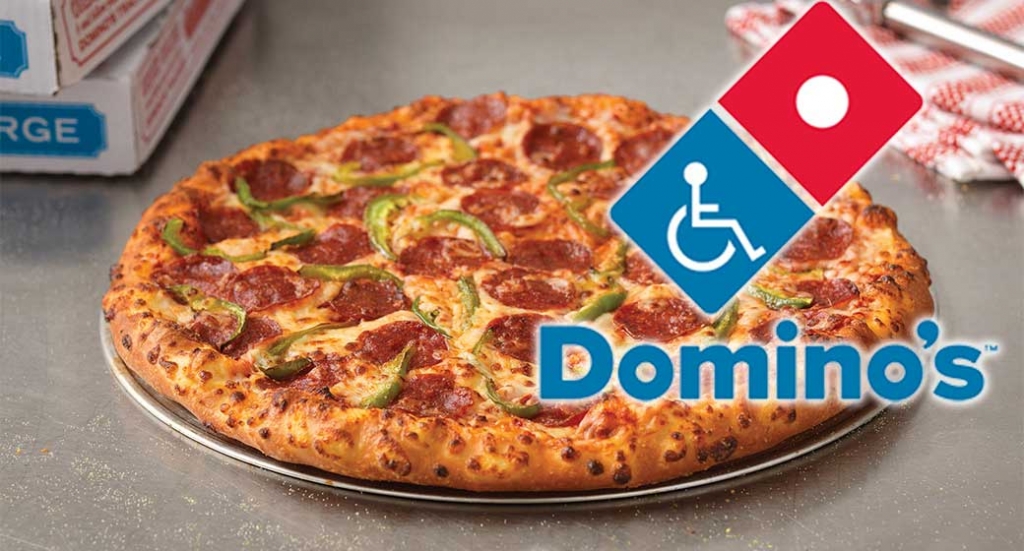On January 15th, the Ninth Circuit Court of Appeals ruled that a case against Domino’s can proceed in court. The case revolves around the issue of Domino’s website and app and meeting the requirements of the Americans with Disabilities Act (ADA). Previously, a lower court ruled in favor of Domino’s and the case was thrown out. However, upon appeal, the court reversed this decision and ruled that the case can proceed in the lower court.
This is a very similar situation to the ruling in 2017 when a New York court ruled that an accessibility lawsuit against the Five Guys restaurant chain could be heard in court.
This case has broad and important implications for the foodservice industry as a whole. The ADA was enacted in 1990 as a civil rights law to prevent discrimination based upon disability. Under the Title III section of the act, commercial businesses (referred to as places of public accommodation) must not discriminate against persons with disabilities.
Buildings built after the law was passed, must comply with the ADA standards. And even if the building was built before the passage of the law, businesses are expected to take reasonable steps to remove barriers for those with disabilities so that they may fully participate in and enjoy the benefits of that business.
Accessibility for Websites & Apps
The wrinkle in this case is that it does not involve the company’s physical locations. Instead, it focuses on the company’s website and mobile app.
“Here, Robles does not seek to impose liability based on Domino’s failure to comply with WCAG 2.0. Rather, Robles merely argues—and we agree—that the district court can order compliance with WCAG 2.0 as an equitable remedy if, after discovery, the website and app fail to satisfy the ADA.”Court Domino’s Pizza Ninth Circuit Opinion
Similar to the guidelines for physical buildings, the ADA has long held the position that a business’ online properties must also accommodate persons with disabilities.
The World Wide Web Consortium (W3C) develops international web standards. To address access by persons with disabilities, the W3C developed the Web Content Accessibility Guidelines (WCAG). These are the standards that will be judged in the Domino’s case.
The WCAG standards set guidelines for how websites should accommodate persons with disabilities. For example, if video is used then captions must be provided for deaf users. Similarly, for blind users, the website or app must provide accommodation for screen readers to allow the site content to be read aloud.
The case is not a ruling about Domino’s accessibility per se. However, it does clear the way for a lower court to impose compliance with the standard if it is determined that Domino’s website and app fail to satisfy the ADA requirements.
Implications for the Foodservice Industry
Delivery services are one of the biggest trends of the last year. This ruling sends a fairly clear message that these services, whether they be a website or a mobile app, need to comply with the ADA or they open themselves up for legal challenges.
The implications of this ruling may also apply to third-party delivery services such as Postmates, UberEats and Amazon Restaurants.
Even if a restaurant does not do delivery via their website, they may still be required to comply with the standards as they offer their websites as part of their overall service offering.
Another high-profile accessibility case was highlighted recently. Superstar Beyonce Knowles’ company, Parkwood Entertainment, was the target of a class action lawsuit. The initial complaint was brought by a blind woman who claims that she cannot use Beyonce’s website without the assistance of a sighted companion. Beyonce’s website sells items and the suit contends that visually impaired users cannot fully enjoy these services because the website is not ADA compliant.
It remains to be seen if purely informational websites (i.e. non-transactional websites) will be subject to the same standards. However, many legal observers believe that a company’s website is considered part of its overall services and thus is subject to compliance with the ADA standards.
What Can Restaurants Do?
The short answer here is to make sure that your website and mobile apps are accessible to people with disabilities. However, this is often easier said than done.
Lawyer Lainey Feingold makes a pretty good argument that if you are going to have to spend money, it’s better to spend it on improving your website’s accessibility than on more lawyers to defend against class action suits such as these.
“Let’s take lawyers out of the web accessibility equation. Money is better spent on web developers, designers, user experience folks and others who can make the web (and mobile!) available to all,” says Feingold.
In the meantime, we will continue to monitor the status of the Domino’s case as it makes its way through the federal courts in California.



